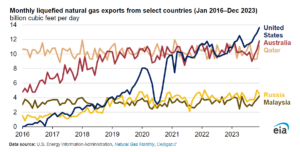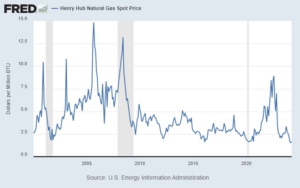Johnson’s Fossil Gas Giveaway Removes Key Protections for Families and Small Businesses
By Alan Zibel
American utility customers, from households heating their homes to businesses making goods, would be far more vulnerable to dramatic energy price spikes under misguided legislation being pushed by fossil fuel allies on Capitol Hill.
This legislation would dramatically weaken the U.S. government’s ability to protect American energy consumers from price gouging. To do so, it proposes eliminating a crucial requirement that exports of liquefied methane gas (also called liquefied natural gas or LNG) be in the public interest.
In a cynical ploy, House Speaker Mike Johnson, a Republican funded by oil interests in his home state of Louisiana, wants to slip this legislation into a larger bill that includes billions for Ukraine for its war with Russia. It previously passed the Republican-controlled House in February on a largely party-line vote of 224-200.
Johnson’s move, which the White House has rebuked, is just the latest example of fossil fuel allies trying to undermine the Biden administration’s January decision to pause new export licenses for liquefied methane terminals. Using repeatedly debunked talking points, litigation and revolving door hired guns, they have marshaled every available tool to restart rubber-stamp approvals for these carbon bombs. The pause, it should be noted, only applies to proposed facilities still in the permitting phase. It does not impact ongoing U.S. exports of gas overseas, which are at record levels and the highest in the world.

On Friday morning, the far-right House Freedom Cauus went even further, demanding an end to the Biden administration’s pause of LNG export license approvals in exchage for funding to reconstruct the collapsed Key Bridge in Baltimore.
Big Oil promotes LNG export growth because expanded exports generate windfall profits from overseas customers in Asia and Europe, who typically pay much higher prices than U.S. customers. In doing so, the oil and gas industry puts the needs of buyers in Beijing and Berlin over American consumers.
By entangling US natural gas markets with global market volatility and price shocks, oil and gas companies have increased profits at the expense of US consumers and industry — and oil and gas-funded lawmakers on Capitol Hill are helping them at every turn.
Oil and gas companies aim to keep domestic gas prices high by shipping enough methane overseas to tighten domestic supplies. Prices have been falling rapidly this year from their Ukraine war highs, threatening the industry’s future profits. Expanded LNG exports would help take up this slack, increasing prices for U.S. consumers while boosting corporate profits.

The bill, misleadingly named the “Unlocking our Domestic LNG Potential Act of 2024” would eliminate the Department of Energy’s long-standing authority to determine whether exports of methane gas are in the public interest. Under a federal law passed in 1938, natural gas exporters need explicit approval from the federal government.
In enacting the Natural Gas Act, Congress found that “the business of transporting and selling natural gas for ultimate distribution to the public is affected with a public interest, and that Federal regulation in matters relating to the transportation of natural gas and the sale thereof in interstate and foreign commerce is necessary in the public interest.” (Emphasis added.)
A move to repeal 86 years of consumer protections against Big Oil price gouging would have been unheard of years ago, yet House GOP leadership is promoting this radical evisceration of protections for working families —showing the strength of Big Oil’s grip on House Republicans.
The Biden administration’s pause on pending and future LNG export applications while it revamps criteria used to consider proposed export projects will allow the federal government to update its outdated and deficient approach to reviewing LNG export applications.
The current approval process ignores overwhelming evidence that LNG exports expose American families to higher energy costs, pollute communities of color, and spew greenhouse gas emissions that imperil our climate. The Energy Department undertook a similar process for determining whether LNG imports were in the public interest in 1984, and now, four decades later, the Department is initiating a long-overdue process of clarifying how it considers the impacts of exports.
Industrial gas consumers, alongside environmental and consumer groups, are backing the Biden administration’s stance, warning that “without action by the DOE to insulate the U.S. market from the impacts of LNG exports, consumers and the entire economy will be impacted with accelerating natural gas and electricity inflation for decades to come.” (Power production is a main use of methane gas, so businesses and consumers alike are focused on the policy’s impact on electricity prices.)
The House bill’s lead author is Rep. August Pfluger, a Republican from Texas who has received more than $1.6 million in oil industry campaign contributions since his first campaign in 2020. Speaker Johnson has received more than $470,000 in oil industry campaign contributions since his first election in 2016.
They are two among many House lawmakers who have received large sums of fossil fuel campaign cash. Since President Joe Biden’s 2021 inauguration, lawmakers backed by the fossil fuel industry have repeatedly spouted industry talking points and distorted the Biden administration’s record on energy issues, falsely claiming that the administration has been engaged in a “war on energy” even as domestic production soars.
The American Petroleum Institute, the industry’s main lobbying group in Washington, has been defending the LNG buildout by arguing that LNG “provides supply options for America’s allies — most notably to the European Union amid Russia’s aggression against Ukraine” — even though 60 left-leaning European legislators say they do not need more gas as Europe engages in a rapid shift toward renewable energy and energy efficiency.
In fact, more than half of the expected volume for eight pending LNG facilities would go to speculators at Big Oil traders and speculators, according to our analysis of long-term supply contracts. That means gas will be sold for the highest possible profits, restricting supplies available to American families.
Nearly a quarter of the total pending contract volume will go to companies headquartered in China. Venture Global, the company proposing the massive Calcasieu Pass 2 (CP2) LNG project in Louisiana, has signed contracts to sell LNG to Chinese firms (Sinopec, China Gas, and China National Offshore Oil Corp) across several U.S. LNG projects.
Speculators profiting from LNG exports include oil giants with trading arms such as BP and Shell as well as independent commodity trading houses like Vitol, and Trafigura. These companies will send future LNG cargoes to where prices are highest, exploiting local price spikes to earn huge profits while pushing up prices for consumers around the globe — particularly Americans, who generally pay less for gas.
No amount of misleading energy industry lobbying can undo a simple reality: The expansion of U.S. LNG export capacity simply empowers Big Oil giants and commodity traders to earn eye-popping profits while American residential and business consumers pay more in the long run.